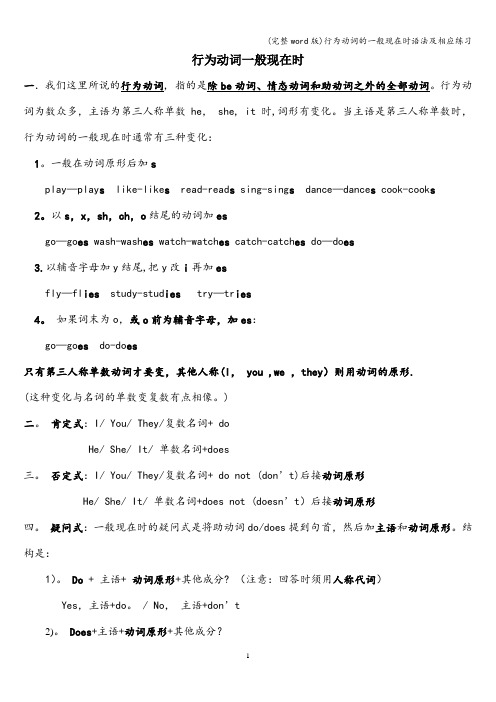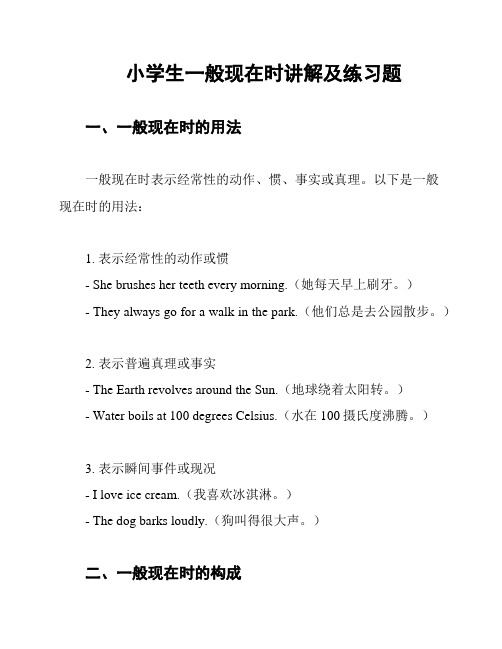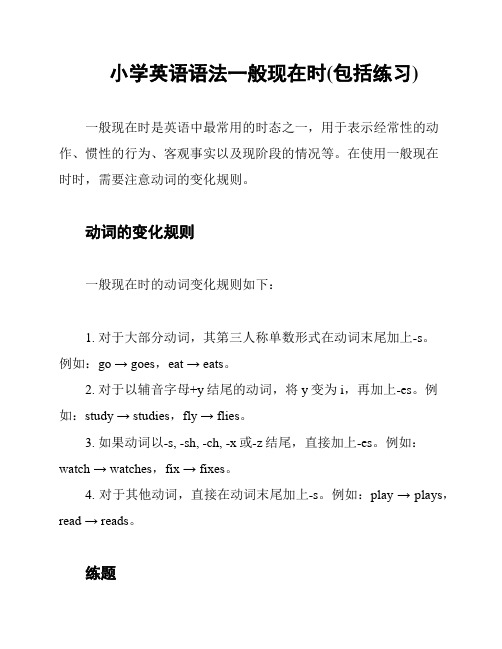行为动词的一般现在时语法及相应练习
Unit 2 重要语法精讲 (行为动词的一般现在时) 七年级上册英语单元核心知识(牛津译林版)

04
行为动词的一般现在时 句型变化
04
行为动词的一般现在时
句型变化
当主语非三单时,添加助动词do;
否定句:do not/don’t +动词原形 疑问句:do置于主语前,行为动词用原形
肯定句:The twins want to be a doctor. 否定句:The twins don’t want to be a doctor. 一般疑问句:Do the twins want to be a doctor?
3. Lilyy aannddLLinidnadagodsohno’ptpginog sohnoSpupnidnagy.o(n改S成u否nd定a句y.)
05 随堂练习
04 随堂练习
填写动词的适当形式(带*为易错题)
1. Peter __l_o_o_k_s (look) very sad. How __is___ (be) he? 2*. Who _h_e_l_p_s_ (help) wyohua,t和Towmh?o作主语,看作三单 3. Some students in our class ___d_o__ (do) well in Math. 4. He usually w__a_lk_s__(walk) to school. 5*. Everyone of us _w_a_n_t_s__ (want) to win.
day twice a month
Tim goes skating four time a month. They play volleyball once a week. She travels to Beijing once a year.
once 一次 twice 两次 数字+times ...次
一般现在时用法及专项练习

一般现在时(the simple present tense)一、定义是一种英语语法形式,表示规律性、通常性、习惯性、真理性的动作或状态。
二、结构(一)肯定句1. 主语 + be 动词(am/is/are)+ 其他。
例如:I am a student.(我是一名学生。
)2. 主语 + 动词原形。
例如:We play basketball on weekends.(我们在周末打篮球。
)3.主语(第三人称单数)+动词第三人称单数形式。
一般在动词词尾加 -s 或 -es。
例如:He plays football after school.(他放学后踢足球。
)Tom usually goes to school at 7:30.(汤姆通常7点半去学校。
)(二)否定句1. 主语 + be 动词(am/is/are)not +其他。
例如:I am not a student.(我不是一名学生。
)2. 主语 + do not(don’t) +动词原形。
例如:We do not play basketball on weekends.(我们周末不打篮球。
)3.主语(第三人称单数)does not(doesn’t )+动词原形。
例如:He does not play football after school.(他放学后不踢足球。
)(三)一般疑问句1. Be动词+主语+其他?例如:Is she a student?(她是学生吗?)2. Do/Does + 主语 + 动词原形?例如:Do you play football after school? (你放学后踢足球吗?)Does he work here? (他在这里工作吗?)三、用法1. 描述习惯或重复动作:常与表示频率的时间状语连用。
例如:I get up at 6 o'clock every morning. (我每天早上六点起床。
)He goes to school by bus. (他乘公共汽车上学。
(完整word版)行为动词的一般现在时语法及相应练习

行为动词一般现在时一.我们这里所说的行为动词, 指的是除be动词、情态动词和助动词之外的全部动词。
行为动词为数众多,主语为第三人称单数he, she, it时,词形有变化。
当主语是第三人称单数时,行为动词的一般现在时通常有三种变化:1。
一般在动词原形后加splay—play s like-like s read-read s sing-sing s dance—dance s cook-cook s2。
以s,x,sh,ch,o结尾的动词加esgo—go es wash-wash es watch-watch es catch-catch es do—do es3.以辅音字母加y结尾,把y改i再加esfly—fl ies study-stud ies try—tr ies4。
如果词末为o,或o前为辅音字母,加es:go—go es do-do es只有第三人称单数动词才要变,其他人称(I, you ,we ,they)则用动词的原形.(这种变化与名词的单数变复数有点相像。
)二。
肯定式:I/ You/ They/复数名词+ doHe/ She/ It/ 单数名词+does三。
否定式:I/ You/ They/复数名词+ do not (don’t)后接动词原形He/ She/ It/ 单数名词+does not (doesn’t)后接动词原形四。
疑问式:一般现在时的疑问式是将助动词do/does提到句首,然后加主语和动词原形。
结构是:1)。
Do + 主语+ 动词原形+其他成分? (注意:回答时须用人称代词)Yes,主语+do。
/ No,主语+don’t2)。
Does+主语+动词原形+其他成分?Yes,主语+does。
/ No, 主语+doesn’t.(注意:回答时须用人称代词)五. 那么,什么情况下用行为动词的一般现在时呢?当这个动作经常发生或表示习惯性的动作时,通常用一般现在时,它经常与表示频度的时间状语连用,如,当句子中有every day every year ,on Sunday, in the morning ,often, sometimes,usually, at one o’clock等词时,用一般现在时。
小学生一般现在时讲解及练习题

小学生一般现在时讲解及练习题一、一般现在时的用法一般现在时表示经常性的动作、惯、事实或真理。
以下是一般现在时的用法:1. 表示经常性的动作或惯- She brushes her teeth every morning.(她每天早上刷牙。
)- They always go for a walk in the park.(他们总是去公园散步。
)2. 表示普遍真理或事实- The Earth revolves around the Sun.(地球绕着太阳转。
)- Water boils at 100 degrees Celsius.(水在100摄氏度沸腾。
)3. 表示瞬间事件或现况- I love ice cream.(我喜欢冰淇淋。
)- The dog barks loudly.(狗叫得很大声。
)二、一般现在时的构成在一般现在时中,动词的变化相对简单。
1. 对于第三人称单数(He/She/It),动词要加-s或-es。
- He walks to school every day.(他每天走路去学校。
)- She eats an apple.(她吃一个苹果。
)- It runs fast.(它跑得很快。
)2. 对于其他人称(I/You/We/They),动词不变。
- I play soccer on weekends.(我周末踢足球。
)- You read books every night.(你每晚读书。
)- We go swimming in summer.(我们夏天去游泳。
)- They watch movies together.(他们一起看电影。
)三、练题请根据句意填入正确的动词形式。
1. My mother __________ (cook) dinner for us every evening.2. Tom and Lisa __________ (play) tennis on Saturdays.3. The sun __________ (rise) in the east.4. We __________ (study) English at school.5. Dogs __________ (bark) when they see strangers.1. cooks2. play3. rises4. study5. bark希望以上讲解和练习题对你有帮助!。
小学英语语法时态归纳及练习(含答案解析)

英语时态归纳一、一般现在时:标志词:often(经常) sometimes(有时) always(总是) usually(通常) never(从不) every(每一)行为动词词型变化形式:一般现在时动词只有第三人称有词形变化;其他人称(第一人称:I, we;第二人称:you;第三人称复数:they、my friends)动词均用原形。
当主语是第三人称单数时,一般动词在一般现在时句子中的变化规律:1、多数在动词后加s:play—plays like—likes ,2、以s,x,sh,ch,o结尾的动词加es wash–washes catch–catches do–does3、以辅音字母加y结尾,把y改i再加es fly—flies study—studies4、以元音字母加y结尾,直接加s buy – buys5、不规则变化have—has一般现在时基本用法功能1.表示事物或人物的特征、状态。
如:The sky is blue.天空是蓝色的。
2.表示经常性或习惯性的动作。
如:I get up at six every day.我每天六点起床。
3.表示客观现实。
如:The earth goes around the sun.地球绕着太阳转。
The earth is round.构成1. be动词:主语+be(am,is,are)+其它。
如:I am a boy.我是一个男孩。
2.行为动词:主语+行为动词(+其它)。
如:We study English.我们学习英语。
句型肯定句:A.be动词:主语+ be + 其它成分He is a worker.B.行为动词:主语+动词(注意人称变化) +其它成分We like the little cat.否定句:A.be动词:主语+ be + not+其它成分They are not students.B.行为动词:主语+助动词(do/does) + not+动词原形+其它成分We don’t like the little cat.一般疑问句:A.be动词:Am / Is /Are +主语+ 其它成分Are you a teacher? Yes, I am. / No, I am not.Are they students of your school. Yes, they are / No they aren’t.B.行为动词:助动词(Do/Does)+主语+动词原形+ 其它成分Do you like it? Yes, I do. / No. I don’t .Does he(she) like it? Yes, he( she )does. / No, he ( she )doesn’t.特殊疑问句:疑问词+ 一般疑问句A.be动词:How many students are there in your school?B.行为动词:What do you usually do on Sunday?一般现在时动词be和have的变化形式1.动词Be 叫连系动词, 用法:第一人称单数用am,第三人称单数用is,其它人称用are。
小学英语语法一般现在时(包括练习)

小学英语语法一般现在时(包括练习)一般现在时是英语中最常用的时态之一,用于表示经常性的动作、惯性的行为、客观事实以及现阶段的情况等。
在使用一般现在时时,需要注意动词的变化规则。
动词的变化规则一般现在时的动词变化规则如下:1. 对于大部分动词,其第三人称单数形式在动词末尾加上-s。
例如:go → goes,eat → eats。
2. 对于以辅音字母+y结尾的动词,将y变为i,再加上-es。
例如:study → studies,fly → flies。
3. 如果动词以-s, -sh, -ch, -x或-z结尾,直接加上-es。
例如:watch → watches,fix → fixes。
4. 对于其他动词,直接在动词末尾加上-s。
例如:play → plays,read → reads。
练题请根据句子的语境,用适当的动词形式填空。
每个空格只填一个单词。
1. Peter ___________ (like) to play basketball with his friends every weekend.2. My mother ___________ (work) as a nurse in the hospital.3. The cat ___________ (sleep) on the sofa most of the day.4. We ___________ (watch) movies at the cinema every Friday night.5. Sarah ___________ (brush) her teeth twice a day.参考答案1. Peter likes to play basketball with his friends every weekend.2. My mother works as a nurse in the hospital.3. The cat sleeps on the sofa most of the day.4. We watch movies at the cinema every Friday night.5. Sarah brushes her teeth twice a day.以上是关于小学英语语法一般现在时以及练习题的内容。
一般现在时结构及练习

一般现在时结构及专项练习概念:1. 表示现在的状态I am twelve。
2。
表示经常或习惯性动作He gets up at six。
3。
表示客观事实真理The earth goes around the sun。
标志性词语:often,usually,sometimes,always,never,on Sunday,every year/month/dayShe often goes to school on foot.He goes to park once a week。
行为动词第三人称单数加—s 的形式1。
一般动词直接加-s 2。
以辅音字母+y,把y 改i 再加es,3. 以s,x,sh,ch 结尾的动词加-es 4。
以o 结尾的动词一般加—es5. 特殊情况:have—has基本结构Be 型:肯定式:主语+ am/is/are +其他否定式:主语+ am/is/are+not+其他一般疑问句:Am/Is/Are+主语+其他?特殊疑问句:特殊疑问词is/are+主语?实义动词型:肯定式:主语+行为动词(注意人称三单形式)+其他否定式:主语+don't/doesn’t+动词原形+其他一般疑问句:Do/Does+主语+动词原形+其他?特殊疑问句:特殊疑问词+do/does+主语+动词原形?1写出下列动词的第三人称形式wash: watch:study:finish:go:snow:carry:stop:see:drive:let:teach:keep:join:put:do:drink:enjoy play:begin:take:run: fly:talk:stay:look:think:carry: fix:单项选择1。
There _____ an English film at the cinema now.A:is B:are C:am D:be2. The picture nic e. A:look B:looks C:looked D:be look3. He sits down and soon asleep.A:fall B:falling C:falled D:falls4。
精品牛津7AU2语法-行为动词一般现在时讲解和练习(含答案).docx

行为动词的一般现在时态的学习一.行为动词:除be动词、情态动词、助动词以外的动词,也叫实义动词。
二.概念:一般现在时表示经常发生的动作或存在的状态。
三.常与always、oft en> usual ly> some ti mes、everyday、in the morningson Sundays等时间状语连用。
如:We go to school every day.He often does his homework in the evening.China is a big country.四.用法:1)表示经常性的动作2)表示客观真理、客观存在、科学事实3)表示格言或警句4)表示现在时刻的状态、能力、性格、个性5)在时间和条件状语从句中代表一般将来时。
五.构成:一般现在时主要用动词原形,如果主语是第三人称单数动词变三单, 具体规则如下:规则举例读音变化大多数动词后加S make-makes live-lives清辅音后的s读/s/;浊辅音或元音后的s读/z/以ch, sh, ss或X结尾的动词后加es Teach-teaches fin ish-fi nishesguess-guesses fix-fixeses 读/iz/以辅音字母+y结尾的动词,去掉y,再加ies carry-carries cry-cries es读/z/;注:如果动词以元音字母+y结尾z不适用此规则。
如:play-plays以辅音字母+0结尾的动词后加esgo-goes es 读/z/楙变化have-has行为动词一般现在时的否定句式是在行为动词前添加do not或does not,当主语是第三人称单数时,助动词用does0在非正式行文中,do not和does not可以缩写成don't 和doesn't.如:Students do not go to school on Sunday.学生周日不上学。
- 1、下载文档前请自行甄别文档内容的完整性,平台不提供额外的编辑、内容补充、找答案等附加服务。
- 2、"仅部分预览"的文档,不可在线预览部分如存在完整性等问题,可反馈申请退款(可完整预览的文档不适用该条件!)。
- 3、如文档侵犯您的权益,请联系客服反馈,我们会尽快为您处理(人工客服工作时间:9:00-18:30)。
行为动词一般现在时一.我们这里所说的行为动词, 指的是除be动词、情态动词和助动词之外的全部动词。
行为动词为数众多,主语为第三人称单数he, she, it时,词形有变化。
当主语是第三人称单数时,行为动词的一般现在时通常有三种变化:1.一般在动词原形后加splay-play s like-like s read-read s sing-sing s dance-dance s cook-cook s2.以s,x,sh,ch,o结尾的动词加esgo-go es wash-wash es watch-watch es catch-catch es do-do es3.以辅音字母加y结尾,把y改i再加esfly—fl ies study—stud ies try-tr ies4.如果词末为o,或o前为辅音字母,加es:go-go es do-do es只有第三人称单数动词才要变,其他人称(I, you ,we ,they)则用动词的原形。
(这种变化与名词的单数变复数有点相像。
)二. 肯定式:I/ You/ They/复数名词+ doHe/ She/ It/ 单数名词+does三. 否定式:I/ You/ They/复数名词+ do not (don’t)后接动词原形He/ She/ It/ 单数名词+does not (doesn’t)后接动词原形四. 疑问式:一般现在时的疑问式是将助动词do/does提到句首,然后加主语和动词原形。
结构是:1). Do + 主语+ 动词原形+其他成分? (注意:回答时须用人称代词)Yes,主语+do. / No, 主语+don’t2). Does+主语+动词原形+其他成分?Yes,主语+does. / No, 主语+doesn’t.(注意:回答时须用人称代词)五. 那么,什么情况下用行为动词的一般现在时呢?当这个动作经常发生或表示习惯性的动作时,通常用一般现在时,它经常与表示频度的时间状语连用,如,当句子中有every day every year ,on Sunday, in the morning ,often, sometimes, usually, at one o’clock等词时,用一般现在时。
例句:He gets up at 6 o’clock.She usually watch es TV in the evening.Sometimes he goes to school by car.Tom often flies a kite on Sunday.1. I (go) to school at seven in the morning.2. Mike ( do) his homework at eight in the evening.3. His father often ( read) books in the library on Saturday.4.My mother usually (watch) TV plays at home.5. My cousin sometimes (play ) cards with me.6. you often (study ) after school ? Yes, I ./No, I .7. Mike and Tom usually (fly ) kites on Sunday.8. They (go) to school by bus every day.9. She (go ) to school by bus every day.10.We usually (listen ) to the radio in the morning.11. He usually (listen ) to the radio in the morning.12. he usually (listen ) to the music at home? No, he .13.—your parents have a car?—Yes, they . / No, he .14.—Alan a computer?—.15.—Do you volleyball? —Yes,I do.16. Bill Smith sports games on TV every Sunday evening.17.Sonia Hall five baseballs. A.have B.don’t have C.doesn’t has D.doesn’t have ( )18.Jane often play sports.But she always watches them on TV.A.doB. don’tC.doesD.doesn’t( )19.- __Sandra _dessert?-Yes, she does.A. Do; likeB. Does; likesC. Is; likeD. Does; like( )20.Do you like to have _ _?A. lots of chickensB.some chikensC. more chickensD.some chicken ( )21.—What do you like__?—Strawberries. A.have B.eat C.to have D.has ( )22.—Do you like broccoli?--__ .I like to eat it.A. Oh, noB. Yes, I doC. Yes, I amD.No, I don’t( )11.-__your teacher like movies?-No, she doesn’t. A.Are B.Can C.Do D.Does ( )12.—Does Emma like action movies?-__.She likes Jackie Chan’s film very much.A.Yes, she is.B.No, she doesn’tC.Yes, she doesD.No, she isn’t( )13.—Do you want __ some new clothes?—Yes, I do.A.buyB.to buyC.buysD.buying( )14. Teresa doesn’t like documentaries(纪录片). She thinks it’s .A.interestingB.shortC.difficultD.boring( )15. Robert like__to the movies very much. A.go B.goes C.to go D.to goes ( )16. Tom wants to go to the movies ___ his friends.A.and B.with C.in D.for ( )17. Mr Green comes to China to ___ Chinese. A.learn B.know C.see D.watch ( )18. I _ the thrillers are scary, so I don’t like them.A.want B.need C.think D.make ( )19.—Does your sister_to a movies?—I don’t know.A.wants to goB.want to goC.want go( )20.—What kinds of sports _ Rick _?---Tennis and soccer.A. does; likeB. is; likeC. do; like( )21.—When do you usually get up, Eric?-__6:30 in the morning.A.InB.OnC.WithD.At( )22. Mingming to bed late __ evening.A.goes;in theB.goes;inC.go;in theD.go;in( )23. She _ to the shop __ Saturday afertnoons. A.goes;in B.go;on C.goes;on ( )24. They would like to __ No.11 bus to the Great Wall. e B.go C.take ( )25. Jack’s parents are workers. They always __ back home at five every morning.A.goB.goesC.go toD.goes to( )26.—__ do you usually shower?—Eight o’clock. A.What B.How C.What time ( )27. Marie __ to school at half past eight. She goes to school early.A.don’t goes usuallyB.don’t usually goesually doesn't go( )28.—__ your father __ at home on Sunday?—No, he doesn't.A. Is;stayB. Do;stayC. Does;stay( )29.My father _ a new car and he_ it very much. A.have,like B.has,likes C.has,like ( )30.—What do you always do __ ?—Play soccer.A.on weekendsB.nowst Friday1.I go to school at 7:30 every morning.(一般疑问句)______ ______ __________ to school at 7:30 every morning?2. We can see some birds.(一般疑问句) ______ ______ see ______ birds?3. He designs clothes.(一般疑问句) ______ he ________ clothes?4.There are some flowers on the teachers’desk.(一般疑问句)______ ______ ______ flowers on the teachers’ desk?5.There are some apples on the tree.(否定句)There ______ ______ ______ apples on the tree.6. I think he is very old.(否定句)7. Please colour it green.(否定句)I ______ think he ______ very old. ______ ______ colour it green.8.They have lunch at 12:00.(变否定句) ______ _______ ______ __________at 12:00.9.You have some hot dogs.(一般疑问句)_______ ______ ______ ______ ________ ?10.There aren’t any pears in the box.(同义句) There are ______ pears in the box.11.What ______ this sign _________? This sign means “No smoking”.12.She writes stories in the evening.(改为否定句)She stories in the evening.13.She is young.(改为一般疑问句)______ ______ ____________?14.My pencils are in the pencil-box.(对划线部分提问) ______ ______ your pencils?15.I get up at six every morning.(对划线部分提问)______ _____ you get up every morning?16.Daming likes to walk home.(改为一般疑问句)______ Daming ________ _______ _______ _________?17.These are cars.(用buses改写成选择疑问句) Are these cars______ ______ ?18.My plant is one month old.(划线部分提问)_______ ______ ______ _______ plant?19.Two boys are in our house.(改为同义句)______ ______ two boys in our house.20.We have maths after break today. (就划线部分提问)_______ _______ ______ ______ after break today?21.Miss Li goes to Hong Kong by plane.(否定句)Miss Li ________ _________to Hong Kong by plane.22. The women work in the shoe factory.(就划线部分提问)_______ _______ ______ women __________?23.He is happy, because he is going to take a trip tomorrow.(就划线部分提问)_______ _______ ______ _________?24.My father cooks the meals well.(就划线部分提问)_______ ________ ________ father __________ well?25.You drink water often.(一般疑问句)_______ ______ _______ water often?26.Lingling goes to church on Sunday.(一般疑问句)to church on Sunday?27. _____ she know all the answers ? Yes , she ____ . / No, she _____.28. _____ the twins often fight ? Yes ,_____ do. /No, _____ don’t.29. _____ your dad like listening to music? Yes ,____ does . /No, _____ doesn’t30. _____ you have a new teacher? Yes , I ______. / No, I ______.31. _____ she a teacher? Yes, she _____ . / No, she _____.32. _____ your father smoking in the living room? Yes, ____ is./ No, he _____.33. giraffes in America? Yes, they ./ No, they .34. Mary monkeys? Yes, she ./ No, doesn’t.。
